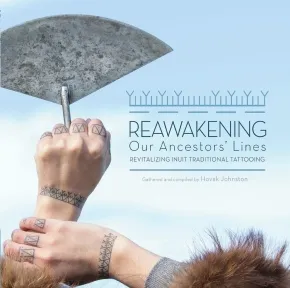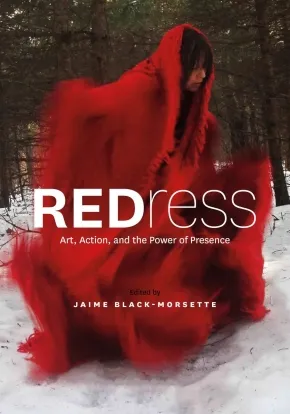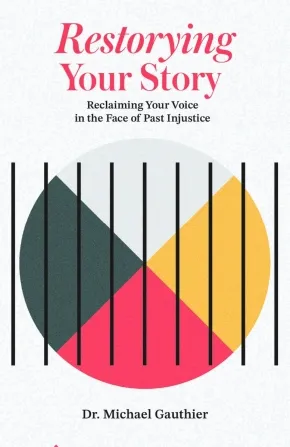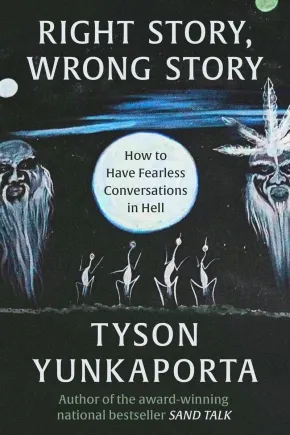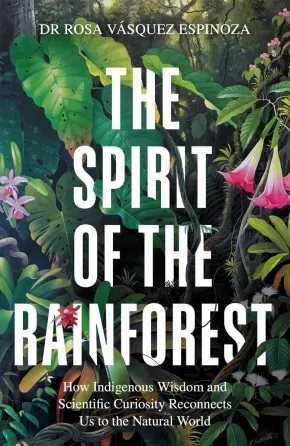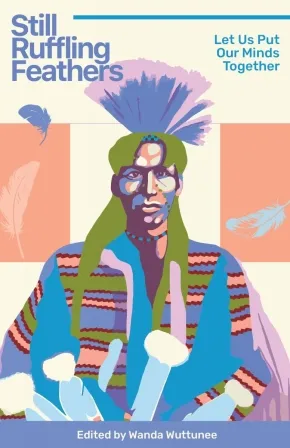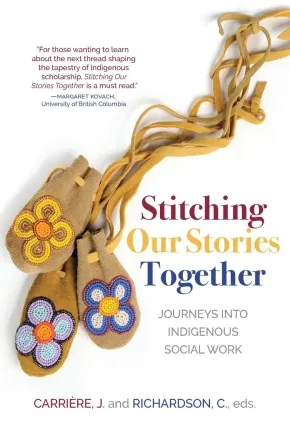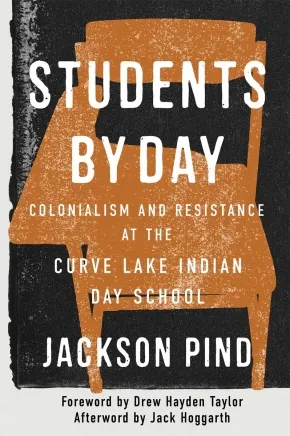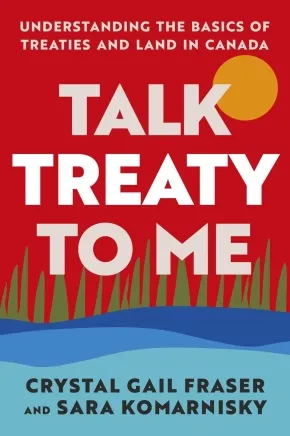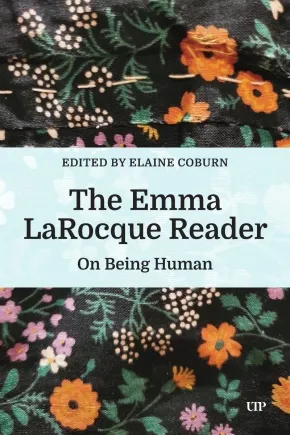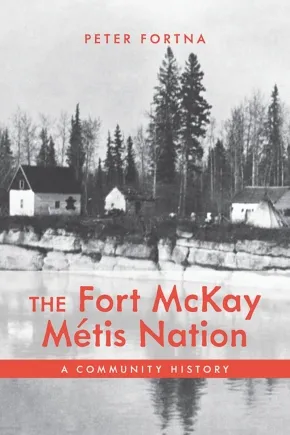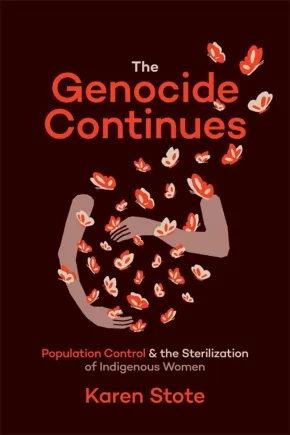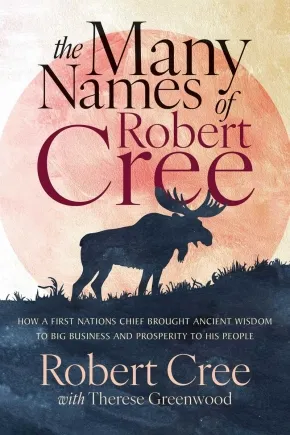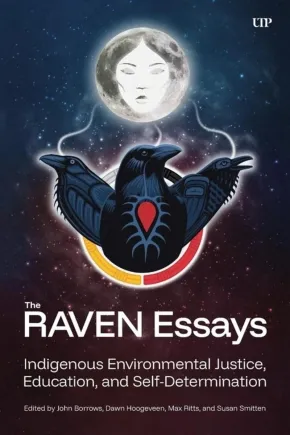Social and Cultural Studies
Synopsis:
For thousands of years, Inuit practiced the traditional art of tattooing. Created the ancient way, with bone needles and caribou sinew soaked in seal oil, sod, or soot, these tattoos were an important tradition for many Inuit women, symbols etched on their skin that connected them to their families and communities. But with the rise of missionaries and residential schools in the North, the tradition of tattooing was almost lost. In 2005, when Angela Hovak Johnston heard that the last Inuk woman tattooed in the old way had died, she set out to tattoo herself in tribute to this ancient custom and learn how to tattoo others. What was at first a personal quest became a project to bring the art of traditional tattooing back to Inuit women across Nunavut, starting with Johnston’s home community of Kugluktuk. Collected in this beautiful book are moving photos and stories from more than two dozen women who participated in Johnston’s project. Together, these women have united to bring to life an ancient tradition, reawakening their ancestors’ lines and sharing this knowledge with future generations.
Awards
- 2018 NorthWords Book Prize Winner
Reviews
"This gorgeous photographic essay on the Inuit Tattoo Revitalization Project is a deeply personal and affirming work about learning and preserving traditions-and reclaiming what residential schools tried to destroy."-School Library Journal
Additional Information
72 pages | 10.00" x 10.00" | Paperback
Synopsis:
A powerful anthology uniting the voices of Indigenous women, Elders, grassroots community activists, artists, academics, and family members affected by the tragedy of Missing and Murdered Indigenous Women, Girls, and Two-Spirit people from across Turtle Island.
In 2010, Métis artist Jaime Black-Morsette created the REDress Project—an art installation consisting of placing red dresses in public spaces as a call for justice for Missing and Murdered Indigenous Women, Girls, and Two-Spirit people (MMIWG2S). Symbolizing both absence and presence, the red dresses ignite a reclamation of voice and place for MMIWG2S. Fifteen years later, the symbol of the empty red dress endures as families continue to call for action.
In this anthology, Jaime Black-Morsette shares her own intimate stories and memories of the REDress Project along with the voices of Indigenous women, Elders, grassroots community activists, artists, academics, and family members affected by this tragedy. Together they use the power of their collective voice to not only call for justice for MMIWG2S, but honour Indigenous women as keepers and protectors of land, culture, and community across Turtle Island.
Reviews
“REDress is a must-read for anyone who seeks to truly understand the hearts of those most impacted by MMIWG2S. For allies and interested citizens, this anthology shows how Canada emboldened and fostered a society to inflict genocide against Indigenous women, girls, and Two-Spirited and transgendered relatives.”—Sheila North, Former Grand Chief, Creator of hashtag #MMIW, Mother and Kookom
“REDress is a love offering to MMIWG2S and those who are intimately impacted by this epidemic.”—Cathy Mattes, curator, writer, and Associate Professor in History of Art at the University of Winnipeg
"This is a moving look at how women in indigenous communities are using art and activism to keep the the issue at the forefront, despite the lack of progress in solving or preventing the crimes.... A content warning signals that the book contains language concerning violence against women. I’d offer this to activist artists or anyone interested in justice for indigenous communities, in high school and up." - Youth Services Book Review - Stephanie Tournas, Retired librarian, Cambridge, MA
Educator Information
Content Warning: This book's content deals with violence against Indigenous women, girls, and Two-Spirit people; genocide; death; intergenerational trauma; suicide; and residential schools.
Big Ideas: Diverse and Inclusive Representation: Identity; Land-Based or Place-Based Learning; Social-Emotional Learning: Death, Grief, Bereavement; Social-Emotional Learning: Self Expression, Creative Writing, Art; Social Justice: Citizenship and Social Responsibility; Social Justice: Impacts of Colonization and Colonialism; Social Justice: MMIWG2S; Social Justice: Prejudice and Racism.
Edited by: Jaime Black-Morsette
Contributions by: KC Adams, Mackenzie Anderson Linklater, Marjorie Beaucage, Christi Belcourt, Judy Da Silva, Karine Duhamel, Deantha Edmunds, Cambria Harris, Jaimie Isaac, Casey Koyczan, Crystal Lepscier, Lee-Ann Martin, Diane Maytwayashing, Cathy Merrick, Sherry Farrell Racette, Gladys Radek, Zoey Roy, Jennifer Lee Smith, and Patti Beardy.
Additional Information
168 pages | 7.00" x 10.00" | Paperback
Synopsis:
A guide that provides ideas and action steps for bringing Indigenous perspectives and philosophies of land-based learning into professional practice, in the classroom and beyond.
Renewal, the second book in the Footbridge series, guides K–12 educators in bringing Indigenous voices and the philosophy, principles, and practices of Indigenous land-based education into their teaching. This text encourages educators to:
- respectfully renew their own relationships with land directly engage students with the land, no matter where they are located
- guide students in learning through observation, listening, and discussion and to take action in response
- honour diverse ways of knowing and being
- understand historic injustices and engage with the contemporary Land Back movement
Through critical engagement with diverse written and visual works created by Indigenous leaders, land defenders, scholars, and Knowledge Keepers, experienced educators Christine M'Lot and Katya Adamov Ferguson support readers in connecting with Indigenous perspectives on land and water. They offer guidance on bringing Indigenous works into the classroom, including concrete ways to facilitate discussions around land-based topics, advice for land-based activities, and suggestions for how students can engage with these topics through inquiry learning.
In this resource, you will find:
- prompts for individual reflection and group discussion
- valuable concepts and methods that can be applied in the classroom and beyond
- practical action steps and resources for educators, parents, librarians, and administrators
Use this book as a springboard for your own learning journey or as a lively prompt for dialogue within your professional learning community.
Reviews
"Renewal lays out a simple and practical approach to land-based education. It works from the premise that land-based education is not simply “taking the classroom outside,” but is about "education on the land, about the land, and from the land.” The spiritual foundation of earth-based cultures is about living in your place as one small, equal part of the land (land being the entirety of air, earth, water, living beings, and spirits), a foundation common to most Indigenous cultures on this planet. I hope that others adopt it in their journey to become more holistic educators and maybe even make a positive difference in shaping how we humans interact with the land." — Dr. Garry Merkel, Director, Centre of Indigenous Land Stewardship, The University of British Columbia
Educator & Series Information
For use with grades K to 12.
This book is part of The Footbridge Series. This series aims to bridge curricular outcomes with Indigenous-centered content and perspectives from across Turtle Island. Like a footbridge, this series is intended to provide a path between Indigenous worldviews and the classroom, engaging differences, including tensions, and highlighting the importance of balance, all while helping teachers integrate Indigenous perspectives into multiple disciplines within the K-12 education system.
Contributions by Nicki Ferland, Peatr Thomas, Tyna Legault Taylor, Shannon Webb-Campbell, Tasha Beeds, Sonny Assu, Shalan Joudry, Tricia Logan, Dakota Bear, Shirli Ewanchuk, Dan Henhawk, Réal Carrière, Hetxw'ms Gyetxw Brett D. Huson, Reanna McKay (Merasty)
Photographs by Inuksaq Angotingoar, Makayla Aupaluktuq, Brendan Kingilik, Carina Kingilik, Kyle Lareau, Quin Mikkungwak, Narkyagik, Kaylee Rumbolt, Marissa Scottie, Nathan Snow, Connor Tagoona-Niego, Koen Tapatai, and Shelly Tunguaq
Additional Information
224 pages | 7.00" x 10.00" | Paperback
Synopsis:
The stories we tell ourselves about our lives matter. How we make sense of the past affects how we make sense of the present— it can mean the difference between continuing patterns of harm and being the one to break the cycle. Scholar and author Michael Gauthier knows this struggle intimately. As a young Indigenous man grappling with the lasting effects of colonialism and intergenerational trauma, Michael turned to addiction to ease the pain and found himself in the prison system. In the intervening years, Michael has worked to understand how Indigenous people can find empowerment through the act of restorying their own lives. Gauthier draws on his PhD research in which he carried out Restorying circles using the Medicine Wheel as a guide to help formerly incarcerated Indigenous men map a new future by looking to their past. Now in Restorying Your Story, Gauthier invites readers to explore the universal application of restorying, and how it can be a powerful tool for all of us to build a good life.
Additional Information
150 pages | 8.50" x 5.50" | Paperback
Synopsis:
Continuing the work of the award-winning Sand Talk, Tyson Yunkaporta casts an Indigenous lens on contemporary society, challenging us to face conflict and embrace conversation to find our way onto the right track.
With Right Story, Wrong Story, Apalech Clan member Tyson Yunkaporta, from far north Queensland, tackles the divisions that prevent us from talking to one another. Yunkaporta invites us to confront life’s biggest questions and arms us with the tools we need to really listen, and to open our minds to change based upon our connections with others. He makes this point through discussions with a diverse range of people across social and political divides including:
- liberal economists
- memorization experts
- Frisian ecologists
- and Elders who are wood carvers, mathematicians, and storytellers.
Building upon the Indigenous tradition of “yarning” to weave our individual narratives into the great narrative that includes us all across any and all differences, Yunkaporta argues that story is at the heart of everything. But what is right or wrong story?
Synopsis:
A competing title to the bestselling Braiding Sweetgrass - a fascinating insight into the Amazon rainforest from scientist and peruivan-born explorer Dr Rosa Espinoza.
Before you step into the jungle, there are a few things you need to know...
Join scientist Dr Rosa Vasquez Espinoza as she uncovers one of the most unexplored regions on the planet.
Dr Rosa is no stranger to the Amazon. Growing up with the rainforest as her back garden, she learnt the lessons of the rainforest from her grandmother, a native healer in natural medicine. She went on to pursue a classical education in science, gaining a PhD in the US, but has always been pulled back to the heart of the Amazon. As a leading biologist in her field, Rosa continues to explore the region through a unique blend of scientific inquiry and ancient insight.
In this debut, you'll learn about Dr Rosa's journeys in the Amazon: her treacherous encounters with a boiling river, her conservation work with stingless bees, her experience of taking ayahuasca as a natural psychedelic - and all the amazing biodiversity of the rainforest.
At the heart of Rosa's expedition is her passion to combine science with the indigenous knowledge of the Amazon. She shares her experience of learning from the indigenous communities that she visits, and shows what they have to teach us - stretching beyond the realm scientific knowledge. Here Rosa learns the most important lessons in how to reconnect to the natural world - and, in turn, will teach us to do the same.
In this book, Rosa celebrates the richness of Amazonian culture, the wonders of biodiversity, and the enduring spiritual connections between humanity and the natural world.
Additional Information
336 pages | 6.45" x 9.65" | Hardcover
Synopsis:
Revisiting the political activism of WIC Wuttunee
William (Bill) Wuttunee was a trailblazing lawyer, a courageous native rights activist; and one of the architects of the process for the Truth and Reconciliation Commission. His 1971 book, Ruffled Feathers: Indians in Canadian Society, decried conditions on reserves and pressed for integration-on Indigenous peoples' own terms-supporting many of the aims of the Trudeau government's 1969 "White Paper." Though controversial at the time, Wuttunee's arguments were rooted in a foundational belief in the strengths of his people and a steadfast rejection of victimhood. In the fifty years that have followed its publication, Ruffled Feathers has been largely forgotten, though ideas that Wuttunee put forth-ending the Indian Act and the reserve system-continue to find space within contemporary Canadian political discourse.
In this volume, editor Wanda Wuttunee gathers a diverse cohort of scholars to engage with her father's ideas and offer their own perspectives on the opportunities and challenges facing Indigenous peoples in Canada, then and now. Favouring discourse over conclusions, Still Ruffling Feathers leads the reader to a nuanced understanding of the ongoing conversations and unresolved issues stemming from the Indian Act and invites us to envision miyo-pimâtisiwin, "the good life."
Reviews"
"Still Ruffling Feathers explores an important area of modern history on Indigenous leadership. The thoughts and ideas expressed by William Wuttunee still have resonance today." - Dr. Brian Caillou, University of Calgary
Educator Information
Table of Contents
Brotherhood by William I.C. Wuttunee
Acknowledgements
Contributors
Introduction by Wakchan (Wanda Wuttunee), Red Pheasant Cree Nation, Saskatchewan
Chapter 1. Reflections on a Legacy--An Eagle Eye Perspective by Wakchan (Wanda Wuttunee), Red Pheasant Cree Nation, Saskatchewan
Chapter 2. Still Ruffling Feathers Too--More than 50 Years Later by Makookins (Xakiji (Chief) Lee Crowchild), Tsuut'ina Nation, Alberta
Chapter 3. William Wuttunee--Ruffling Feathers in "Indian" Time and Space by Thohahoken (Michael Doxtater), Mohawk Turtle Clan Family of Satekariwate, Ontario
Chapter 4. Learning to Straighten Our Ruffled Feathers: An Education by Askîy Pihêsiw (Robert Falcon Ouelette), Red Pheasant Cree Nation, Saskatchewan
Chapter 5. Ruffled Feathers: A Critical Assessment by Bush Doctor (Peter Kulchyski), Bissett, Manitoba
Chapter 6. Final Thoughts--Debating Our Future, Coming to One Mind by David Newhouse, Onandaga, Six Nations of the Grand River, Ontario.
Appendix A: Excerpts from Ruffled Feathers (1971) by William I.C. Wuttunee
Appendix B. Selected Poetry of William I. C. Wuttunee
Appendix C. Discussion Questions Bibliography
Additional Information
204 pages | 5.50" x 8.50" | Paperback
Synopsis:
A collection of graduate research by Indigenous social work scholars.
Stitching Our Stories Together showcases emerging scholars who, by centering their own nations, communities, and individual realities, demonstrate how Indigenous knowledges can challenge settler ideas and myths around pan-Indigeneity.
This collection is bookended with reflections from the scholars’ thesis supervisors, who describe their philosophy of mentoring and supporting students through an Indigenous lens, and how their pedagogies embrace the significance of relationality in Indigenous worldviews.
Stitching Our Stories Together points toward a future where Indigenous ways of knowing and being take their rightful place in spaces of higher learning and social work practice—a necessary intervention in a discipline that has historically been complicit in colonialist harm.
Reviews
“For those wanting to learn about the next thread shaping the tapestry of Indigenous scholarship, Stitching Our Stories Together is a must read.” —Margaret Kovach, University of British Columbia
“These teachings of Indigenous ways of knowing and being, written by Indigenous graduate students who share their ideas, stories, and life experiences, open the door for new ways of doing within academia, within social work practice, and within broader society.” —Dr. Sheri M. McConnell, Memorial University
“The profound and transformative impact of Indigenous senior scholars uplifting Indigenous graduate students pursuing thesis research is truly remarkable...The intergenerational exchange of knowledge and support creates a powerful legacy, ensuring that the voices and perspectives of Indigenous scholars continue to flourish and inspire future generations.” —Dr. Amanda LaVallee
Educator Information
Table of Contents
Acknowledgements xi
Introduction by Catherine Richardson and Jeannine Carrièrexiii
1. Supervision and Mentoring: Beyond the Destination 1
Jeannine Carrière and Catherine Richardson
PART ONE. EMBEDDING CHILD WELFARE RESEARCH INTO INDIGENOUS METHODOLOGIES
2. Researching Culturally Informed Approaches: Supporting Indigenous Youth Aging Out of Ministry Care 25
Robert Mahikwa
3. A Métis Grandmother’s Knowledge: Stories of Grandmother Teachings and Métis Child Welfare in British Columbia 45
Shelley Lafrance
4. An Inquiry Into the Stories of Indigenous Fathers and Their Paths Into Fatherhood: A Narrative Analysis Conducted With Kwakwaka’wakw Fathers 71
Tanille Johnston
PART TWO. ARTS-BASED KNOWLEDGES AND PRACTICES
5. centring stories by urban indigiqueers/trans/two-spirit people and indigenous women: on practices of decolonization, collective care, and self-care 91
mel lefebvre
6. Stitching Ourselves Back Together: Urban Indigenous Women’s Experience of Reconnecting with Identity through Beadwork 123
Shawna Bowler
7. Reconstituting Indigenous Identities through Portraiture and Storytelling: Reclaiming Representation for Indigenous Women and Two-Spirit People 145
Juliet Mackie
PART THREE. INDIGENOUS BODIES AND MEANING MAKING
8. Dancing My Way Home: Cultural Reclamation Through the Embodiment of the Michif Language 167
Victoria May
9. Researching Through miyo ohpikinâwasowin (Good Child-Rearing): A Framework for Knowledge Emergence and Transmission 203
Lindsay DuPré
10. Fat Bodies in Space: Explorations of an Alternate Narrative 219
N. Katie Webb
Conclusion by Jeannine Carrière and Catherine Richardson239
Epilogue 253
Contributors 257
Additional Information
336 pages | 6.00" x 9.00" | Paperback
Synopsis:
Offering readers a unique history of an Indian Day School and a profile of Anishinaabe resilience.
The atrocities of the residential school system in Canada are amply documented. Less well-known is the history of day schools, which some two hundred thousand Indigenous youth attended.
The Curve Lake Indian Day School operated for over ninety years, from 1899 to 1978. Implementing Indigenous community research practices, Jackson Pind, alongside the Chief and Council of Curve Lake First Nation, conducted a search of the federal archive on operations at the school. Students by Day presents the findings, revealing that the government failed in its fiduciary duty to protect students. Harmful and discriminatory policies forced children to abandon their language and culture and left them subject to many types of abuse. To supplement this documentation, Pind also interviewed survivors of the school, who shared their often difficult testimony. He situates Curve Lake’s development and operations within the wider context of Canadian assimilation policies, noting the lasting impacts on Anishinaabe identity and culture.
Not only recovering the archive, written and oral, but building on files repatriated to the community, Students by Day is a story of Indigenous resilience, activism, and hope in the face of educational injustice.
Reviews
“An incredible achievement. Students by Day is innovative and collaborative, pushing Indigenous historical research forward in ways that will offer real, tangible improvements to communities and individuals.” - Lianne C. Leddy, author of Serpent River Resurgence: Confronting Uranium Mining at Elliot Lake
“Students by Day is an intricate uncovering of day schools’ history, navigating archives and life stories. It sets a gold standard for community-centred research, reminding us of the centrality of love to culture, people, and politics.” - Niigaan Sinclair, author of Wînipêk: Visions of Canada from an Indigenous Centre
“With care, clarity, and accountability, Jackson Pind’s book listens to Curve Lake First Nation and honours survivors’ experiences. Students by Day is not only powerful history; it’s a model for community-based research that serves Indigenous resurgence.” - Crystal Gail Fraser, author of By Strength, We Are Still Here: Indigenous Peoples and Indian Residential Schooling in Inuvik, Northwest Territories
Educator Information
Table of Contents
Figures vii
Foreword: Day Schools xi
Drew Hayden Taylor
Acknowledgments xv
1 Introduction to Place: Growing Up in Michi Saagiig Anishinaabeg Territory 3
2 Researching Indian Day Schools in Canada 15
3 The New England Company and the Creation of the Indian Day School 30
4 Mismanagement and Mistrust: The Methodist Missionary School in Curve Lake 45
5 A Legacy of Neglect: The United Church of Canada’s Indian Day School 86
6 Beyond the Classroom: Educational Philosophies and Opportunities 122
7 Experiencing Indian Day School: Education and Integration 150
8 A Class in Resistance: Curve Lake First Nation’s Fight for Education 173
Afterword 197
Jack Hoggarth
Appendix: Letter of Support from Curve Lake First Nation 201
Notes 203
Index 255
Additional Information
256 pages | 6.00" x 9.00" | 9 photos, 5 drawings | Hardcover
Synopsis:
An essential and easy-to-read guide to treaties, Indigenous sovereignty, and land for all Canadians
Treaties cover much of Canada. Some were established thousands of years ago, with land and animals, and others date back to the time when Europeans first arrived in North America. These agreements make it possible for all of us to live, work, play, and profit on these lands. Additionally, treaties have profoundly shaped the relationship between Indigenous and non-Indigenous people. In Talk Treaty to Me, Crystal Gail Fraser and Sara Komarnisky untangle the complexities of treaties and set a path forward for greater understanding of all our roles, rights, and responsibilities. In this accessible, clear, and concise book, they discuss:
· Treaties among and between Indigenous Peoples
· The history of treaty-making between Indigenous Peoples and Britain, then Canada, from the very beginning to the present day
· Concepts like Métis scrip, modern land claims, Indigenous sovereignty, and unceded territory
· The (dis)honouring of treaties and the role of Canadian settler colonialism
· How the creation of Canadian borders interrupts Indigenous sovereignty and nationhood
· Important insights from gendered and queer perspectives on treaty and land
· The politics of land acknowledgements
· Reconciliation and Land Back movements
And more.
With a quick-reference timeline, maps, and black-and-white photographs throughout, Talk Treaty to Me concludes with a call to action and specific, tangible steps that all of us can take every day to support reconciliation.
Additional Information
256 pages | 5.25" x 8.00" | 40 b&w photos, spot illustrations & maps | Paperback
Synopsis:
Emma LaRocque was born in 1949 in Lac La Biche into a Cree-speaking Métis family. She grew up in a one-room, kerosene-lit log cabin built by her father. At the age of nine, she fought her parents to attend school, where she encountered English and the colonizer’s harmful stereotypes of Indigenous peoples. Confronting the contradictions of colonialism sparked her journey as a writer and scholar, as she sought to understand the dissonance between her identity and the world around her.
The Emma LaRocque Reader is a comprehensive collection of her most significant writings, poetry and prose, offering an intimate window into the mind of one of Canada’s foremost Indigenous scholars. Through her work, LaRocque provides profound insights into the intersections of colonialism, sexism, and racism in Canada, while also critically celebrating the beauty of her community and culture. In the afterword, she reflects on fifty years of challenging the colonial enterprise. A vital contribution to postcolonial literature, The Emma LaRocque Reader intertwines the personal and the political to explore what it means to be human, offering a powerful testament to Indigenous resistance, resilience, and vision.
This collection brings together the works of Métis scholar Emma LaRocque, offering a half-century of her poetry and prose, and shedding new light on Canada, colonialism, and Indigenous resistance.
Educator Information
Chapters
Foreword by Armand Ruffo
Preface by Elaine Coburn
Acknowledgments by Emma LaRocque
Acknowledgments of Permissions to Reprint
Introduction by Elaine Coburn
1975 A Personal Essay on Poverty (Excerpt from Defeathering the Indian)
1983 The Métis in English Canadian Literature
1988 On the Ethics of Publishing Historical Documents
1989 Racism Runs through Canadian Society
1990 Preface: Here Are Our Voices: Who Will Hear?
1990 Geese (poem)
1990 Nostalgia (poem)
1990 “Progress” (poem)
1990 The Red in Winter (poem)
1990 Incongruence (poem)
1990 Loneliness (poem)
1990 Beggar (poem)
1990 Tides, Towns, and Trains
1992 My Hometown, Northern Canada, South Africa (poem)
1993 Violence in Aboriginal Communities
1994 Long Way from Home (poem)
1996 The Colonization of a Native Woman Scholar
1996 When the Other Is Me: Native Writers Confronting Canadian Literature
2001 Native Identity and the Métis: Otehpayimsuak Peoples
2001 From the Land to the Classroom
2004 When the Wild West Is Me
2006 Sweeping (poem)
2006 Sources of Inspiration: The Birth of "For the Love of Words": Aboriginal Writers of Canada
2007 Métis and Feminist
2009 Reflections on Cultural Continuity through Aboriginal Women’s Writings
2010 Native Writers Reconstruct: Pushing Paradigms
2013 For the Love of Place – Not Just Any Place: Selected Métis Writings
2015 “Resist No Longer”: Reflections on Resistance Writing and Teaching
2016 Contemporary Métis Literature: Resistance, Roots, Innovation
2016 Colonialism Lived
2017 Powerlines (poem)
2022 Wehsakehcha, Comics, Shakespeare, and the Dictionary
2023 Afterword
Index
Additional Information
348 pages | 6.00" x 9.00" | Paperback
Synopsis:
This community history chronicles the processes that led to the founding of the Fort McKay Métis Nation in northern Alberta.
This is the definitive history of the Fort McKay Métis Nation. It traces the evolution of the community from the mid-nineteenth to the early twenty-first century, paying special attention to genealogy, land-use, land-tenure, and responses to mass oil sands development.
The Fort McKay Métis Nation carefully considers the community’s unique historical context, drawing on a broad range of sources including archival research, oral histories, grey literature, and community literature. It examines the complex interrelations between the Fort McKay Metis Nation and their neighbors, the Fort McKay First Nation, and their ways they have connected with each other.
Completed in partnership with the community, The Fort McKay Métis Nation provides perspectives which have never before been shared. It is an important, unique history of a community in the heart of the oil sands.
Additional Information
272 pages | 6.00" x 9.00" | Paperback
Synopsis:
Indigenous Peoples in Canada have experienced coerced sterilization under eugenics legislation since the 1930s, and the violence has never stopped, even though eugenics fell into disrepute. In The Genocide Continues, Karen Stote traces the historical, political, economic and policy context informing the coerced sterilization of Indigenous women from 1970 onward. She shows how a powerful idea paved the way for the expanded violations of Indigenous People’s bodies and futures. That idea was population control — a concern with who occupied land and how resources were distributed — and it was a central thread guiding public health interventions from eugenics to family planning.
The Genocide Continues offers new insights to show how federal, provincial and corporate activities intersected to criminalize and regulate Indigenous reproduction. Saskatchewan, which first established family planning policies in the 1970s and is now the province with the highest number of Indigenous women coming forward with experiences of coerced sterilization, is Stote’s case study to demonstrate why family planning activities consistently targeted Indigenous women.
Stote weaves compelling archival evidence with principled storytelling to connect violence against Indigenous bodies to violence against Indigenous lands. Unless and until colonialism, extractivism and dispossession are addressed, a genocide against Indigenous peoples will continue.
Reviews
"Karen Stote has skillfully woven archival documents with evidence in policy, philanthropy, and medicine to show the repulsive side of Canada’s health care system as an assimilation tool. This book recounts the reasons why forced and coercive sterilization of Indigenous Peoples happened and is still happening." - Karen Lawford, Queen's University
Additional Information
288 pages | 6" x 9" | Paperback
Synopsis:
A vital account of the life and many names of Robert Cree, and his plan for a peaceful, sincere, and just path to reconciliation in an angry and chaotic world.
His mother called him “Bobby Mountain.” Elders called him “Great Man.” His people called him “Chief.” Oil men called him “Mr. Cree.” But the government called him “Number 53.” Robert Cree was all of these while facing his people’s oppressors and freeing the ghosts of tortured spirits.
The Many Names of Robert Cree is his first-person account of survival in a brutally racist residential school system designed to erase traditional Indigenous culture, language, and knowledge. It is also the story of an epic life of struggle and healing, as Cree takes the wisdom of his ancestors and a message of reconciliation to the halls of government and to industry boardrooms.
In the storytelling tradition of his people, Cree recounts his early years in the bush, his captivity at a residential school, his struggles with addiction, his political awakening as one of Canada’s youngest First Nation Chiefs, and the rising Indigenous activism of the late 20th and early 21st centuries. He also recounts the oil industry’s arrival on his poverty-stricken reserve and the ensuing struggle to balance economic opportunity with environmental challenges.
Throughout, Cree’s leadership is rooted in his unshakable commitment to the sacred traditional teachings of his people. His beliefs give him the strength to focus on hope, dignity, and building a better future for his community. Now a respected Elder and spiritual leader, Cree champions forgiveness as a powerful force that can bring healing and transformation for all.
Additional Information
264 pages | 6" x 9" | Paperback
Synopsis:
Named after the Respecting Aboriginal Values and Environmental Needs (RAVEN) nonprofit organization, The RAVEN Essays is an anthology that celebrates a decade of prize-winning student essays. Since 2012, RAVEN has awarded an annual essay prize to honour students who champion the vital importance of Indigenous rights and self-determination, both in Canada and globally. The essays featured in this collection highlight exceptional student work while reflecting on the evolving relationship between Indigenous politics and academia. From issues like fishing rights and the Trans Mountain Pipeline to challenges of sexism and conservation policy, these essays capture a transformative period in Indigenous struggles, offering insights that resonate far beyond the Canadian settler state.
The anthology also includes contributions from prominent scholars such as Glen Coulthard, Dara Culhane, Michael Fabris, Sarah Hunt, and Heather Dorries. Five complementary essays explore various aspects of structural change, institutional constraints, and broader commitments to Indigenous knowledge within university settings. Aimed at readers in Indigenous law, environmental studies, anthropology, and geography, The RAVEN Essays is a book created by students for students, and by academics for the academy.
Together, the contributors reflect on the powerful formation and enactment of Indigenous law, environmental stewardship, place-based knowledge, pedagogy, and literacy – both within the academy and in the broader community, across land, water, and culture.
This collection celebrates emerging scholars in Indigenous studies, featuring student essays that explore Indigenous justice, ethics, and environmental justice, while highlighting a decade of collaboration with RAVEN, a legal defence organization.
Educator Information
Chapters
Educator Information
306 pages | 6.00" x 9.00" | 11 Illustrations | Paperback

